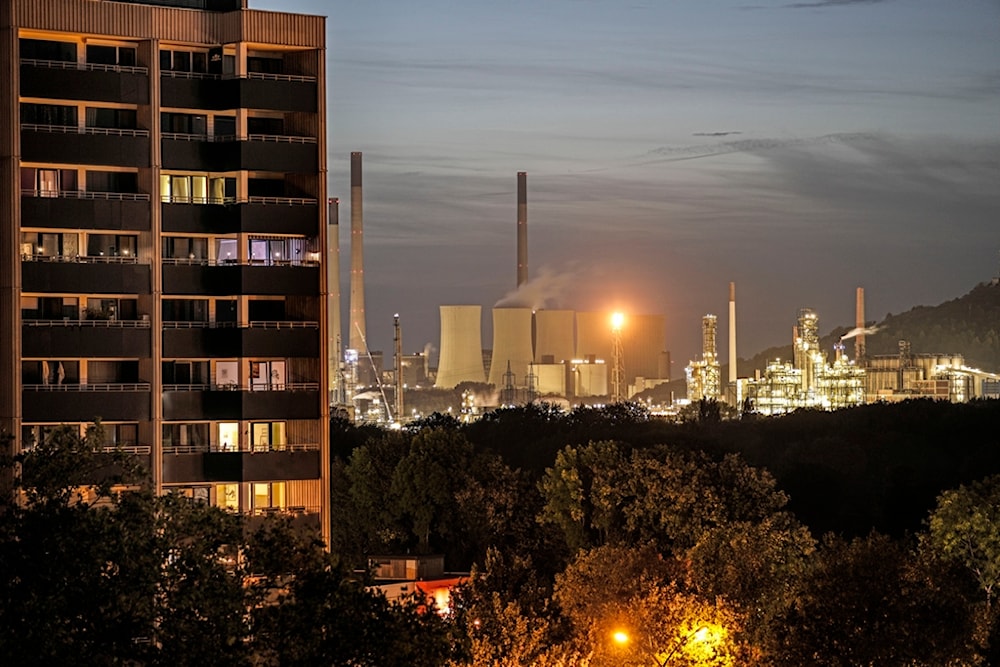No more cheap power in Germany, costs offloaded on locals: Der Spiegel
While wholesale electricity prices have seen a significant decline compared to 2022, the Federal Network Agency's head highlighted that the current price levels remain higher than those before the onset of the war in Ukraine and the subsequent sanctions on Russia.
-

The coal-fired power plant Uniper Scholven and a nearby BP refinery shine in the evening behind illuminated apartments in Gelsenkirchen, Germany, Monday, October 2, 2023. (AP)
Amid a broader cost-of-living crisis, German households are expected to grapple with persistent challenges related to increasing electricity and heating costs, as reported by Der Spiegel citing statements from the country's Federal Network Agency.
Despite a recent 4.5% decrease in household energy prices from the beginning of the year until November 2023, the Federal Network Agency's head, Klaus Muller, emphasized that the era of cheap energy is coming to an end.
In an interview with the Rheinische Post, Muller stated, "The era of cheap energy is over, at least as long as we continue to consume large quantities of conventionally generated energy."
While wholesale electricity prices have seen a significant decline compared to 2022, Muller highlighted that the current price levels remain higher than those before the onset of the war in Ukraine and the subsequent sanctions on Russia. The Federal Network Agency's head expressed skepticism about any imminent change in this trend in the foreseeable future.
Furthermore, the Federal Network Agency raised concerns about additional financial burdens on households, noting that an average four-person household would face an annual increase of $133 in network fees due to the government's decision to eliminate a previously planned $6 billion subsidy.
Read more: Germany's stark rise in arms exports to the Israeli regime
Costs will reach all consumers
Anticipating that network operators would offload the rising costs to consumers, Muller warned, "Sooner or later, the costs will reach all consumers, regardless of when the changes are implemented."
Further compounding the situation, Germany's transmission system operators announced in mid-December that grid fees would surge from 3.12 cents per kilowatt-hour in 2023 to 6.43 cents next year.
The report also highlighted Germany's vulnerability to energy supply disruptions, particularly in the wake of the reduction in Russian energy supplies last year. The country, which previously relied on Russia for 40% of its gas demand, experienced significant cutbacks or complete halts in deliveries after the EU imposed sanctions on Moscow in response to the Ukraine conflict.
The Nord Stream pipelines, responsible for delivering Russian gas to Germany, faced mysterious disruptions, exacerbating Germany's energy challenges.
As households continue to grapple with rising energy costs, the implications of these developments are expected to reverberate throughout the country, underscoring the need for strategic measures to address the ongoing energy affordability crisis.
Read more: Germany's economy not in a great shape, recovery on shaky grounds
Germany could become 'bankrupt' due to energy spending
Germany could soon become a dysfunctional, "bankrupt state" if it stays on the same path it is currently on and fails to deal with the ongoing energy crisis in light of its imbalanced financial policies, Bundestag Vice-President Wolfgang Kubicki said last week.
"If we continue that way and want to provide energy assistance for years, then we could face state bankruptcy rather than state socialism," Kubicki told the German Bild am Sonntag newspaper.
According to the Parliament's deputy speaker, the extra money Germany is currently planning to spend on energy imports from elsewhere than Russia would be withdrawn from other areas, as the surplus can be "neither printed on a money printing machine nor covered by taxpayers."
German left-wing politician and chairman of the Bundestag committee on energy, Klaus Ernst, commented back in September on statements by Chancellor Olaf Scholz that the sanctions should not hit Europe harder than Russia itself, "We have now imposed seven packages of sanctions and Gazprom is making record profits. At the same time, we are threatened with a wave of bankruptcies. Therefore: negotiate with Russia with an open mind."
The largest EU economy is anticipated to contract in 2023, as gas and electricity prices continue to skyrocket. According to the Ifo Institute for Economic Research, the Munich-based think tank, the ongoing energy crisis as a result of the war in Ukraine is “wreaking havoc” on the German economy and they project it could lead to a 0.3% drop in GDP next year.
Read more: Germany buys Russian oil from India: Reports

 4 Min Read
4 Min Read









